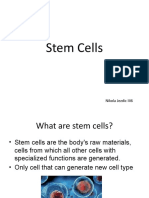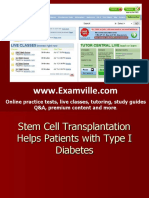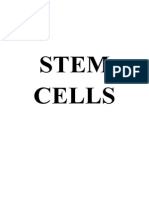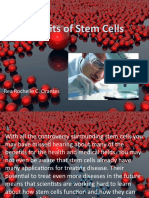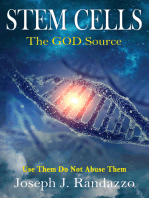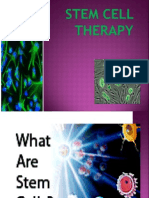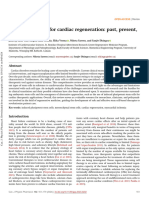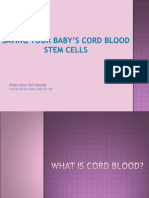Stem Cells Information
Stem Cells Information
Uploaded by
Pauline ZwanikkenCopyright:
Available Formats
Stem Cells Information
Stem Cells Information
Uploaded by
Pauline ZwanikkenOriginal Title
Copyright
Available Formats
Share this document
Did you find this document useful?
Is this content inappropriate?
Copyright:
Available Formats
Stem Cells Information
Stem Cells Information
Uploaded by
Pauline ZwanikkenCopyright:
Available Formats
Stem Cells Information
Embryonic Stem cells
Many stem cells are available in embryos. These can grow into any
type of cell found in the body. All tissues and organs could
potentially be grown. Embryos can be produced specifically for
making stem cells and then discarded. This raises ethical issues.
There is no guarantee how successful these therapies will be.
Transplanted tissues and organs may be rejected by the immune
system of patients. It can be difficult to obtain and store a
patient’s embryonic stem cells. Patients could be exploited by
paying for expensive treatments and being given false hope of a
cure as stem cell therapies are only in their developmental stages.
They could be used to replace cells that have been damaged or
destroyed e.g. diabetes and paralysis
Adult Stem Cells
Some stem cells remain in the bodies of adults as adult stem cells.
Their role is to replace body cells that die through injury and
disease. The adult stem cells can only differentiate into cells from
the type of tissue where they are found e.g. blood stem cells make
only blood, and brain stem cells make only brain cell. As the cells are
from the same body they would not reject their own cells. There are
no embryos involved. Adults give permission for their own bone
marrow to be collected. Some human stem cells growing in labs that
researchers have used in experiments to treat serious diseases
contain serious cancer-causing mutations.
Stem Cells Information
Therapeutic Cloning
The process involves the nucleus of a body cell from the patient being
transferred to an egg cell that has had its nucleus removed. Embryos are
produced specifically making stem cells and then discarded. This raises
ethical issues. There is only a small chance that cells will be rejected by
the patient’s body as the stem cells from the patient are used. Organs
would have an exact match of the patient's DNA.
Therapeutic cloning can help create vital organs. This would be helpful for
people suffering from kidney and other disorders, who are forced to wait
years for a replacement organ. Therapeutic cloning may be helpful for
preventing diseases, research in this area of therapeutic cloning is still
ongoing. The stem cells kept in culture in a lab can show similarities to
cancer cells. The stem cells have undergone about 60 cell divisions and
mutations have been observed. It is also possible for viruses to be
transferred with stem cells, leading to infection.
Extracting eggs from a female is costly and painful for the woman. The
cost of therapeutic cloning is very high.
Umbilical Cord Stem Cells
After a baby is born, stem cells may be collected from blood left in the
umbilical cord. This is a rich source of stem cells that are formed from
the placenta after a child is born and the structure is no longer needed.
These can be frozen and stored for possible use in the future to treat a
medical condition later in that child’s life e.g. a family history of a genetic
disorder. The stem cells are from the same patient so there would be no
rejection. Private cord blood banks let families store the blood for a fee.
There are no ethical issues relating to the use of these stem cells as
embryos aren’t used, but consent from the mother is needed. They could
be used to replace blood cells that have been damaged or destroyed, for
example: blood cell cancer e.g. leukaemia and lymphoma, when blood cells
have been destroyed, e.g during chemotherapy for cancer treatment.
You might also like
- Biology Assignment (Stem Cells)Document3 pagesBiology Assignment (Stem Cells)Dwayne CoelhoNo ratings yet
- Stem Cells DraftDocument41 pagesStem Cells Draftmahim.rashid8No ratings yet
- Stem Cells Nikola JezdicDocument16 pagesStem Cells Nikola JezdicNikola JezdicNo ratings yet
- Stem CellsDocument18 pagesStem CellsJustine Mae CipresNo ratings yet
- Stem Cells Notes - BIO SUmmDocument3 pagesStem Cells Notes - BIO SUmmMuffaddal MustafaNo ratings yet
- Stem CellsDocument4 pagesStem CellsFa IdaNo ratings yet
- 3D Printing in Stem Cell ResearchDocument3 pages3D Printing in Stem Cell ResearchAyush GoplaniNo ratings yet
- Stem CellsDocument12 pagesStem CellsIsha PrabhudesaiNo ratings yet
- Medical Advancement On Cell: ContentDocument14 pagesMedical Advancement On Cell: Contentkirthana17No ratings yet
- Stem Cell Essay by Spencer Shepherd Year 8Document6 pagesStem Cell Essay by Spencer Shepherd Year 8spencer.shepherdNo ratings yet
- Stem Cell ResearchDocument3 pagesStem Cell Researchapi-236886045No ratings yet
- Stem Cell Research HETHICSDocument5 pagesStem Cell Research HETHICSHydieNo ratings yet
- Research Paper - Stem Cells-3Document11 pagesResearch Paper - Stem Cells-3api-549248786No ratings yet
- November of 1998Document3 pagesNovember of 1998ArdeJenniferNo ratings yet
- Stem CellsDocument4 pagesStem CellsJann MacNo ratings yet
- Stem Cell Application and UsesDocument12 pagesStem Cell Application and UsesSwarnapaliliyanageNo ratings yet
- Building A Cohesive Paragraph Doc in Blue Yellow Bright and Colorful Collag - 20240814 - 092913 - 0000Document4 pagesBuilding A Cohesive Paragraph Doc in Blue Yellow Bright and Colorful Collag - 20240814 - 092913 - 0000nispihariyaniNo ratings yet
- Stem Cell Research EssayDocument7 pagesStem Cell Research Essayapi-286667026No ratings yet
- Stem Cell IsscrDocument8 pagesStem Cell Isscrcazzy_luvNo ratings yet
- Bio AbschlussprüfungDocument9 pagesBio AbschlussprüfungDoris KurevijaNo ratings yet
- Note On Stem Cell and Others - 051733Document10 pagesNote On Stem Cell and Others - 051733patmarys247No ratings yet
- Stem Cells and Stem Cell TherapyDocument13 pagesStem Cells and Stem Cell Therapyjoshtsuro2506No ratings yet
- Stem Cells: The Key To Prolonged LifeDocument8 pagesStem Cells: The Key To Prolonged LifeLeslie EdensNo ratings yet
- Stem Cells Are Populations of Relatively Undifferentiated Cells Found in Most Adult Organisms. They Are Capable ofDocument2 pagesStem Cells Are Populations of Relatively Undifferentiated Cells Found in Most Adult Organisms. They Are Capable ofZah SchlafmützeNo ratings yet
- Stem Cell TherapyDocument10 pagesStem Cell Therapymurtesaibrahim7No ratings yet
- Stem CellDocument12 pagesStem Cellapi-121232177No ratings yet
- 5 AdultLimitationsDocument2 pages5 AdultLimitationsJules PreeNo ratings yet
- Thesis Statement About Stem Cell ResearchDocument5 pagesThesis Statement About Stem Cell Researchtehuhevet1l2100% (2)
- Online Practice Tests, Live Classes, Tutoring, Study Guides Q&A, Premium Content and MoreDocument31 pagesOnline Practice Tests, Live Classes, Tutoring, Study Guides Q&A, Premium Content and MoreabctutorNo ratings yet
- Emma Zemanová - Ologies, Stem CellsDocument4 pagesEmma Zemanová - Ologies, Stem CellsEmma ZemanováNo ratings yet
- Take NotesDocument2 pagesTake NotesRickyvhoy CaluzaNo ratings yet
- Literature Review EssayDocument6 pagesLiterature Review EssaySam NeaceNo ratings yet
- What Are Stem CellsDocument8 pagesWhat Are Stem CellsPasipanodya MuzendaNo ratings yet
- ISSCR 11 StemCellFactBrch FNLDocument8 pagesISSCR 11 StemCellFactBrch FNLНваневу Сильванус100% (2)
- What Are Stem Cells?Document5 pagesWhat Are Stem Cells?beverly brittoNo ratings yet
- Adult Stem Cell Additional InfoDocument1 pageAdult Stem Cell Additional InfoSafiya JamesNo ratings yet
- Detailed Notes - Topic 2 Cells and Control - Edexcel Biology GCSEDocument10 pagesDetailed Notes - Topic 2 Cells and Control - Edexcel Biology GCSEAbir OmarNo ratings yet
- Reaction Paper in Gen BioDocument1 pageReaction Paper in Gen BioHensley Sean DichosonNo ratings yet
- 2.3 Introduction To Stem CellsDocument12 pages2.3 Introduction To Stem CellsNicholasNo ratings yet
- Stem Cell ProjectDocument33 pagesStem Cell ProjectAditya SNo ratings yet
- Lesson 16 - 1 Reading ComprehensionDocument2 pagesLesson 16 - 1 Reading Comprehensionstorming25No ratings yet
- Stem CellDocument7 pagesStem CellbaharNo ratings yet
- Stem Cell ResearchDocument6 pagesStem Cell ResearchYeli CruzNo ratings yet
- PowerPoint On Stem Cells Topic 1 IB BiologyDocument9 pagesPowerPoint On Stem Cells Topic 1 IB BiologySamantha DAIRONo ratings yet
- Stem CellsDocument3 pagesStem CellsSea AssakulNo ratings yet
- Stem CellsDocument7 pagesStem CellsPrasant NatarajanNo ratings yet
- Morals and Ethics of Using Stem CellsDocument2 pagesMorals and Ethics of Using Stem Cellssfe sfgNo ratings yet
- Stem Cell Background Webquest Docx 1Document3 pagesStem Cell Background Webquest Docx 1api-301503657No ratings yet
- Stem Cells6Document6 pagesStem Cells6Joseph SalazarNo ratings yet
- 17 ManuscriptDocument10 pages17 ManuscriptBaru Chandrasekhar RaoNo ratings yet
- Benefits of Stem CellsDocument12 pagesBenefits of Stem CellsRea Rochelle javierNo ratings yet
- Stem Cells by Vaidik PatelDocument21 pagesStem Cells by Vaidik PatelRJ Music 2.0No ratings yet
- Stem Cell TreatmentsDocument9 pagesStem Cell TreatmentsTetra HedronNo ratings yet
- TOPIC: Stem Cells Combatting Super Stem CellsDocument3 pagesTOPIC: Stem Cells Combatting Super Stem CellsPark JimiaeNo ratings yet
- Document 2Document2 pagesDocument 2api-286667026No ratings yet
- Advantages and Disadvantages of Stem Cell ResearchDocument4 pagesAdvantages and Disadvantages of Stem Cell ResearchSony JenniNo ratings yet
- Stem Cell: 3.1. DefinitionDocument4 pagesStem Cell: 3.1. DefinitionYolanda Dwi OktaviyaniNo ratings yet
- Stem Cells Term PaperDocument5 pagesStem Cells Term Papercdkxbcrif100% (2)
- EIP FinalDocument9 pagesEIP FinalMeghan OslerNo ratings yet
- What Are The Problems With Stem Cells?Document1 pageWhat Are The Problems With Stem Cells?Pauline ZwanikkenNo ratings yet
- Stem Cells Advantages and Disadvantages WorksheetDocument2 pagesStem Cells Advantages and Disadvantages WorksheetPauline ZwanikkenNo ratings yet
- Stem Cells Exam Qs and Ms HomeworkDocument5 pagesStem Cells Exam Qs and Ms HomeworkPauline ZwanikkenNo ratings yet
- Stem Cell Starter: Name: Mark: /14Document2 pagesStem Cell Starter: Name: Mark: /14Pauline ZwanikkenNo ratings yet
- Y8 Science 2021 - EPI Laboratory Report ScaffoldDocument8 pagesY8 Science 2021 - EPI Laboratory Report ScaffoldPauline ZwanikkenNo ratings yet
- Y8 Science 2021 - EPI Groupwork IntroductionDocument34 pagesY8 Science 2021 - EPI Groupwork IntroductionPauline ZwanikkenNo ratings yet
- An Introduction To Stem CellsDocument14 pagesAn Introduction To Stem CellsAref DahabrahNo ratings yet
- Stem Cell TherapyDocument33 pagesStem Cell TherapyAnusha VergheseNo ratings yet
- Cell Differentiation Exercises 10.4Document4 pagesCell Differentiation Exercises 10.4Sanaa SamkoNo ratings yet
- Synopsis Presentation 1Document11 pagesSynopsis Presentation 1Tejasvi ChavdaNo ratings yet
- Stem Cell Therapy The Future of MedDocument2 pagesStem Cell Therapy The Future of MedAtul DwivediNo ratings yet
- Dissertation On Stem CellsDocument8 pagesDissertation On Stem CellsCollegePaperWritingHelpCanada100% (1)
- 2024 Stem Cell Therapy For Cardiac Regeneration Past Present and FutureDocument19 pages2024 Stem Cell Therapy For Cardiac Regeneration Past Present and FutureGrant AdamsNo ratings yet
- Application of Stem CellsDocument20 pagesApplication of Stem Cellsupkarveerkaur100% (1)
- Assignment - 1 Stem Cell Based Tissue EngineeringDocument2 pagesAssignment - 1 Stem Cell Based Tissue EngineeringSavitaNo ratings yet
- Introduction To Stem Cells and Reproductive BiologyDocument35 pagesIntroduction To Stem Cells and Reproductive BiologyStem Cell Regeneration Center of Thailand100% (1)
- A Stem Cell Story Quick Quiz: Answers: A Cell That Can Make Copies of Itself AND Make More Specialized Types of Cell ADocument2 pagesA Stem Cell Story Quick Quiz: Answers: A Cell That Can Make Copies of Itself AND Make More Specialized Types of Cell AJatinNo ratings yet
- Stem Cells TechnologyDocument5 pagesStem Cells TechnologySam AgullanaNo ratings yet
- Teaching Pla1-Clinical TeachingDocument25 pagesTeaching Pla1-Clinical Teachingnathsujitkr1980No ratings yet
- Stem Cells and Regenerative Medicine: Courses 1Document12 pagesStem Cells and Regenerative Medicine: Courses 1Denisa RadulescuNo ratings yet
- Termofisher Guide Stem CellDocument60 pagesTermofisher Guide Stem Cellnadhifa akNo ratings yet
- Stemcell PosterDocument1 pageStemcell PosterhermannNo ratings yet
- Stem Cells: Introduction and Prospects in MedicineDocument25 pagesStem Cells: Introduction and Prospects in MedicineSumihar PasaribuNo ratings yet
- Kyle Liddle - Argumentative EssayDocument7 pagesKyle Liddle - Argumentative Essayapi-530385868No ratings yet
- Stem Cell Cryobank: Cord Blood and Stem Cells For LifeDocument23 pagesStem Cell Cryobank: Cord Blood and Stem Cells For LifelyndonlinNo ratings yet
- PowerPoint On Stem Cells Topic 1 IB BiologyDocument9 pagesPowerPoint On Stem Cells Topic 1 IB BiologySamantha DAIRONo ratings yet
- Types of Stem Cells and Their Current UsesDocument3 pagesTypes of Stem Cells and Their Current UsesEuroStemCell100% (3)
- Human iPS RT-PCR Primer SetDocument3 pagesHuman iPS RT-PCR Primer SetAlleleBiotechNo ratings yet
- Adult Stem CellDocument9 pagesAdult Stem CellMeloveshop DropNo ratings yet
- (Ac-dnts2020) Đề - Đáp Án Thi Thử 01Document29 pages(Ac-dnts2020) Đề - Đáp Án Thi Thử 01Khai Quang PhamNo ratings yet
- TRANSFAC and JASPAR PWMs TableDocument9 pagesTRANSFAC and JASPAR PWMs Tablealya ghinaNo ratings yet
- Jelkd Jeo QWNDocument25 pagesJelkd Jeo QWNcd_armand1885No ratings yet
- Bancos DubaiDocument2 pagesBancos DubairanasoftNo ratings yet
- Dr. Hwang Woo-Suk 2Document22 pagesDr. Hwang Woo-Suk 2Andreea CucuNo ratings yet
- Thesis About Stem CellsDocument6 pagesThesis About Stem Cellssamantharossomaha100% (3)


